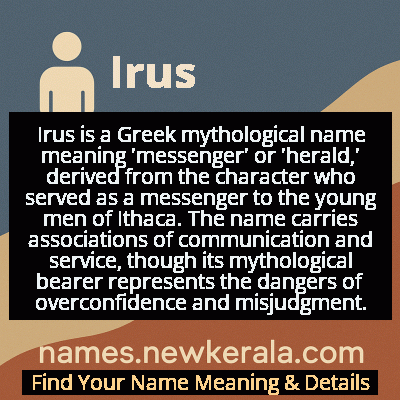Irus Name Meaning & Details
Origin, Popularity, Numerology Analysis & Name Meaning of Irus
Discover the origin, meaning, and cultural significance of the name IRUS. Delve into its historical roots and explore the lasting impact it has had on communities and traditions.
Name
Irus
Gender
Male
Origin
Greek
Lucky Number
4
Meaning of the Name - Irus
Irus is a Greek mythological name meaning 'messenger' or 'herald,' derived from the character who served as a messenger to the young men of Ithaca. The name carries associations of communication and service, though its mythological bearer represents the dangers of overconfidence and misjudgment.
Irus - Complete Numerology Analysis
Your Numerology Number
Based on Pythagorean Numerology System
Ruling Planet
Uranus (Rahu)
Positive Nature
Strong sense of order, loyal, practical, and disciplined.
Negative Traits
Stubborn, overly serious, rigid, and prone to feeling restricted.
Lucky Colours
Blue, gray.
Lucky Days
Saturday.
Lucky Stones
Blue sapphire.
Harmony Numbers
1, 7, 8.
Best Suited Professions
Managers, engineers, accountants, organizers.
What People Like About You
Dependability, discipline, practicality.
Famous People Named Irus
Irus of Ithaca
Mythological Figure
Challenged Odysseus in Homer's Odyssey, serving as symbolic obstacle
Irus (Artist)
Contemporary Artist
Modern Greek visual artist known for innovative classical-themed installations
Irus Braverman
Legal Scholar
Professor known for interdisciplinary research on environmental law
Name Variations & International Equivalents
Click on blue names to explore their detailed meanings. Gray names with will be available soon.
Cultural & Historical Significance
Extended Personality Analysis
The name Irus suggests a personality marked by strong communicative abilities and a tendency to serve as an intermediary, reflecting the original meaning of 'messenger.' Individuals with this name may possess natural charisma and social intelligence, enabling them to navigate complex social situations effectively. However, the mythological association also indicates potential challenges with overconfidence and a tendency to misjudge one's own capabilities relative to others. There's often a contrast between outward presentation and inner reality, with Irus-named individuals potentially projecting more confidence than they genuinely feel. They tend to be resilient and adaptable, able to recover from setbacks, but may struggle with accurately assessing social hierarchies and their place within them. The name implies someone who is fundamentally a survivor, possessing both the strengths and vulnerabilities that come with that archetype.
Modern Usage & Popularity
In contemporary naming practices, Irus remains an exceptionally rare choice, primarily confined to Greece and classical enthusiasts. The name has never achieved mainstream popularity and is typically selected by parents with strong connections to classical literature or those seeking distinctive mythological names. Its usage patterns show occasional spikes in academic communities and among families with Greek heritage, but it remains well outside conventional naming trends. The challenging nature of the mythological character—a boastful beggar who is easily defeated—has likely limited the name's appeal, though some appreciate its uniqueness and literary pedigree. Recent decades have seen minimal change in its usage frequency, maintaining its status as a niche classical reference rather than an emerging naming trend.
Symbolic & Spiritual Meanings
Symbolically, the name Irus represents the complex interplay between appearance and reality, serving as a metaphor for the dangers of judging based on superficial qualities. The character's role as a messenger who fails to recognize true royalty in disguise makes Irus symbolic of failed perception and the limitations of social standing. In broader terms, the name embodies the theme of the 'unworthy challenger' archetype, representing those who overestimate their capabilities and underestimate their opponents. The swift defeat of the mythological Irus symbolizes the inevitable triumph of genuine merit over empty boasting. Additionally, the name carries connotations of service and communication, but with the caveat that these roles can be corrupted by arrogance and misjudgment, making it a rich symbolic reference for discussions about social roles and personal integrity.

